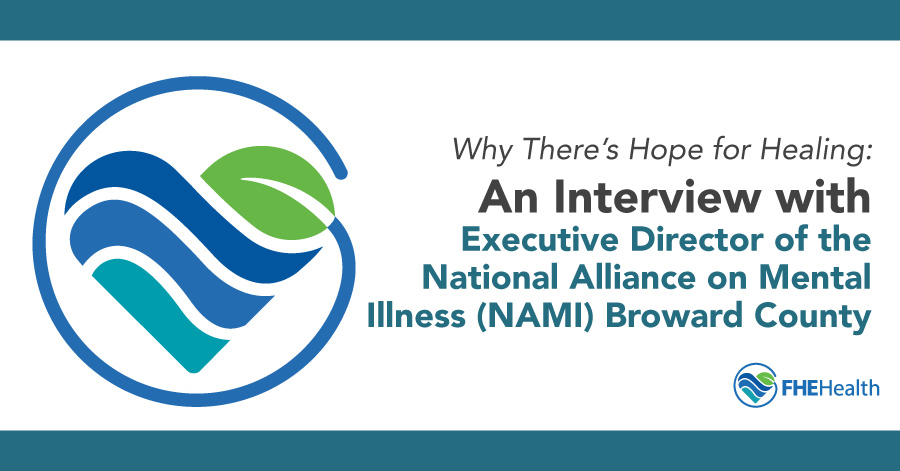
NAMI Broward County is the nation’s largest grassroots mental health organization dedicated to building better lives for the millions of Americans affected by mental illness. At the helm of NAMI Broward County, and a trusted partner of FHE Health in responding to the mental health needs of our community and greater South Florida, is Dr. Sandra Cumper Boynton.

Dr. Cumper Boynton has been working in the mental health field for more than 20 years and recently, after seven years of intensive study on top of her full-time job, earned a doctoral degree in Behavioral Health from Arizona State University. In an interview this month, Dr. Cumper Boynton talked about some of the lessons she has learned from working and studying in the field. She also shared what gives her hope and motivates her to be an “advocate” for people with mental illness and their families. What follow are highlights from that conversation.
You now have a “Doctor of Behavioral Health” (DBH) degree. (Congratulations on this major achievement.) What is a DBH degree, and what did you study?
The DBH degree addresses mental illness using an integrated health model. An integrated health model encompasses both mental and physical health and bridges the gap for primary physicians who may not take the time to address mental health.
I studied population-based behavioral health management, clinical medication pathophysiology, behavioral & psychological assessments in primary care … and other psychology courses. The DBH is considered a professional degree, as a mental health counselor I was able to do this course as a continuation of my studies in counseling and therapy. We (those with a DBH) work in hospitals alongside primary care physicians, to bring this treatment together—because essentially that’s what we need. We’re not psychologists or psychiatrists. We work with people, educating them, directing them, and finding new ways to work through counseling and therapies on the physical and mental issues.
A Doctor of Behavioral Health will meet a patient and talk more about how their physical wellbeing can be impacted by their mental health and how their mental health can be impacted by their physical health. [In the DBH program], we study many of the psych courses that a psychologist study, but we are not psychologists. DBH practitioners are interested in how behaviors affect wellbeing and mental health.
Why did you want to pursue a DBH degree?
When I started my studies back in 2014, the integrated mental health model was a novel idea.
It was people looking at mental and physical health holistically—something in which one impacts the other. Over the years, many organizations including NAMI have adapted the integrated healthcare model.
At NAMI, we offer educational programs and trainings. We try to instill in our communities that it’s important to take care of not just mental health but physical health, and we talk about how each affects the other as part of our training. For example, diabetes and how it relates to your stress level: If you’re not taking care of the stress, chances are you’re going to have a hard time getting diabetes under control. A DBH will reveal to the patient that insomnia can have negative effects on the body, triggering high blood pressure, heart problems, and even obesity. The DBH then advises lifestyle changes or methods of dealing with insomnia. It all relates, and this understanding is something I bring to my community
Would you say that in the majority of mental health cases there is a physical health issue?
Yes, I can tell you … let’s look at an elderly person diagnosed with dementia or Alzheimer’s, which can lead to a decline in mental functioning. The patient may also be experiencing other physical conditions, such as high blood pressure, diabetes, or heart conditions. Additionally, they may be facing other hampering conditions, loss of freedom; loss of family members and friends, being removed from their homes, all these conditions can only lead to further stress and depressive symptoms. Separation of physical health treatment from mental health care often leads to a fragmented system and poor health outcomes.
DBH take all those issues into consideration and treat the patient on a whole. Integrated health care has the ability to help focus on the physical health needs of people with mental illness. Reportedly, people with serious mental illness die earlier than the general population, however; many of these deaths occur because of a chronic physical medical condition. Integrated behavioral healthcare results in better health outcomes for both physical and behavioral health diagnosis.
How did you first get into this work more than 20 years ago? Was there a particular experience that inspired you to become an advocate for people with mental illness and their families?
It probably fell in my lap. I was exposed to working in the social and human services since as long as I can remember. My mother was a social worker, and we were very involved in her social work as kids. She would bring us to work while she led her groups. She worked with all ages and categories from the elderly to young children. We sort of tagged along with her, so I was exposed to social work at a very young age.
As I grew older, I worked as a utilization liaison, … for an organization where I visited mental health hospitals and accounted for the number of beds patients occupied and their length of stay. (Ensuring that the beds were being properly utilized.)
On one of my visits, I met one woman who was actively psychotic. Although I wasn’t supposed to have any interaction with the patients, I couldn’t help but notice. She was naked and belligerent. It was so bizarre to me that I panicked, because I’d never been exposed to anything like that directly.
I walked over to her and asked her, “Can I help you?” She went off. I started talking with her, and she was saying, “I need to be out of here.” When the security guard came over and said I was not supposed to be talking to her, I asked, “Can we get her a blanket?”
At that point, I decided I wanted to help people who are mentally ill. I went back to school and got my master’s degree in mental health counseling. I later started doing assessments and evaluations in hospitals, and then in jails as a counselor for people with mental illness. My next job was working with law enforcement and first responders, being the CIT (crisis intervention training) manager for Broward County. Five and a half years ago I joined NAMI Broward as the executive director. I now work to provide educational programs, advocacy and support to peers, families and caregivers of people living with mental illness. I consider myself an advocate and have been advocating for improved treatment and service for mental health since 1996.
In the current mental health crisis, there’s so much need out there that it must feel overwhelming at times. What encourages you to keep doing this good work?
There are services available to people living with mental illness. The problem is there are never enough services because the prevalence of mental illness is so great. We continue to fight for services at NAMI because the people who are living with these illnesses are our brothers, sisters, family members. Their brain is sick, so we can’t give up on them.
When I started this work, I wanted to save every person who was living with a mental illness. I very quickly realized that was not remotely possible. It took working in our jails to realize that if I can help one person experience a better quality of life then I am content.
I’ll share one satisfying story: I worked with an individual who was committed to a Tallahassee forensic hospital and later, after being found competent to stand trial, was returned to a Broward County jail. As I worked with him and we progressed to the point where he was discharged to the community and could now become a productive citizen, I thought that was the end of it. I was shopping one day after work, and I saw this couple walking behind me, and I had no recollection of who they might be.
Then the woman came over to me and said, “You are Ms. Cumper. I just want to thank you. This is my husband. This is his name. Do you remember him? He’s out of the hospital and out of the jail and he’s doing so well, and this is our baby. These small incidents propel me to do what I do on a daily basis.
I also employed a young man, who was diagnosed with schizophrenia. We worked together for 4 years; and he was a great employee. He’s thriving today and continues to do well even though he no longer works with us, as he has relocated to another state. He’s independent and active in his community and remains one of my success stories. This gives me hope that recovery is possible with treatment, education, and support.
People need help and they need somebody to advocate for them, and that is what I do.
FHE Health is a proud supporter of NAMI and its mission to educate individuals and families affected by mental illness.






